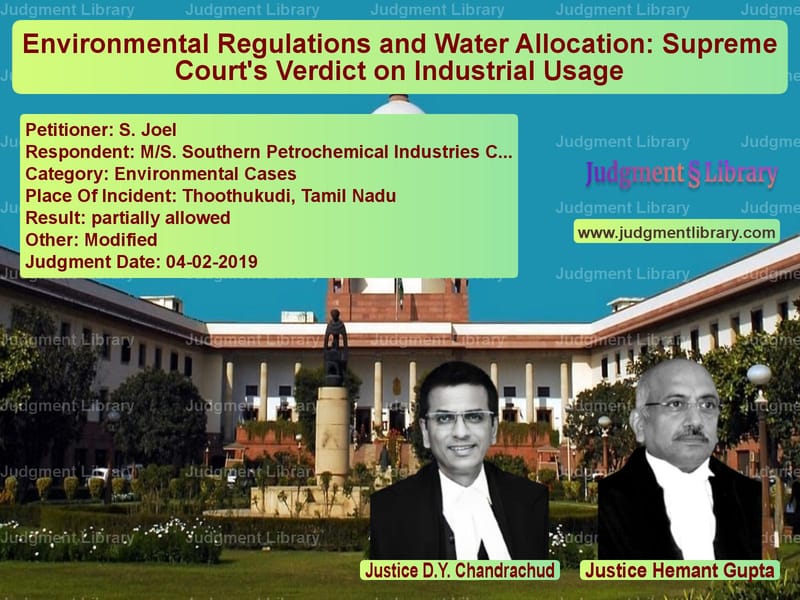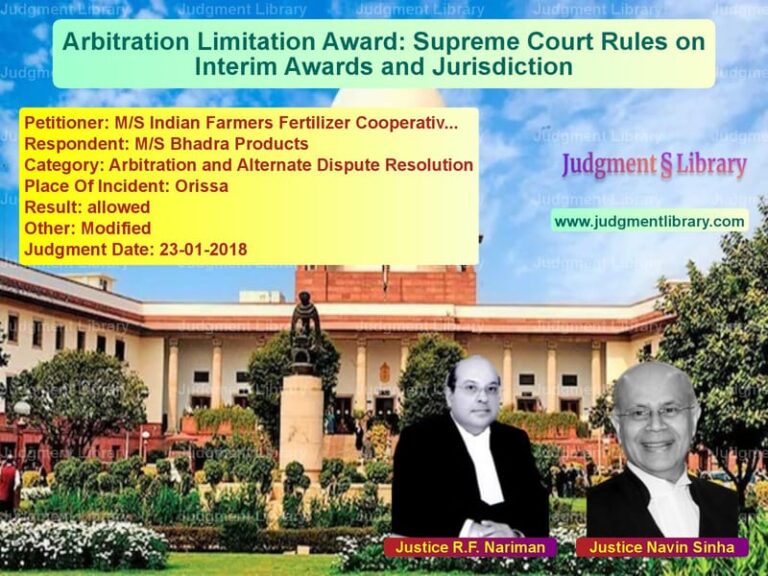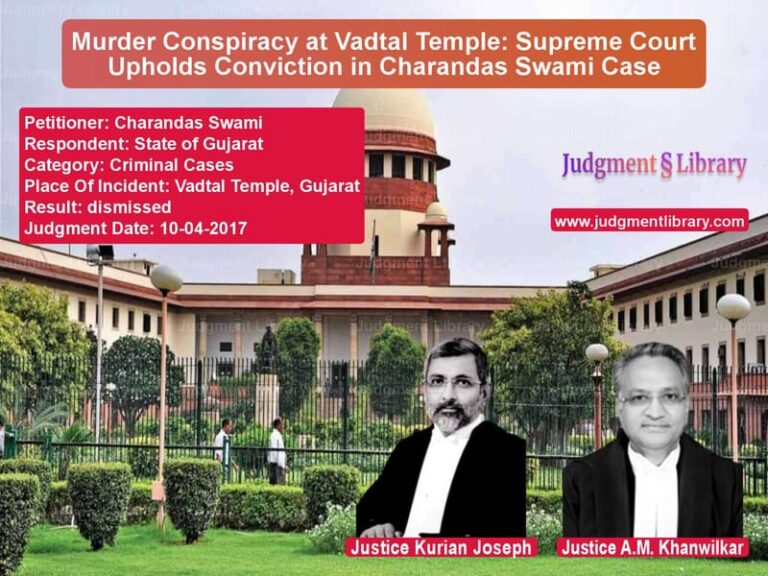Environmental Regulations and Water Allocation: Supreme Court’s Verdict on Industrial Usage
The Supreme Court of India recently adjudicated a crucial case concerning environmental regulations, the diversion of forest land, and water usage for industrial purposes. This case, titled M/S. Southern Petrochemical Industries Corpn. Ltd. vs. S. Joel & Ors., involved significant deliberations on the legal boundaries of water allocation, the authority of the National Green Tribunal (NGT), and the compliance of state governments with the Forest (Conservation) Act, 1980.
The case arose from an order passed by the National Green Tribunal (NGT) on 28 November 2018, which directed the Tamil Nadu Water Supply and Drainage (TWAD) Board to prohibit the use of water drawn under a forest clearance for industrial purposes. The NGT’s directive emphasized that the water had been allocated solely for drinking purposes, and its diversion to industries violated environmental regulations. The Supreme Court’s decision in this matter has far-reaching implications for water management, environmental law, and industrial operations in the country.
Background of the Case
The core issue in the case revolved around the diversion of forest land for water extraction. On 15 June 2004, the Ministry of Environment and Forests (MoEF) issued guidelines regulating the diversion of forest land for non-forest purposes under the Forest (Conservation) Act, 1980. These guidelines were subsequently clarified on 3 January 2005 and delegated the authority to state governments to permit diversion of forest land up to one hectare for specific public utility purposes. The permissible activities included:
- Schools
- Dispensaries/hospitals
- Electric and telecommunication lines
- Drinking water projects
- Water/rainwater harvesting structures
- Minor irrigation canals
- Non-conventional sources of energy
- Skill up-gradation/vocational training centers
- Power substations
- Communication posts
- Police establishments
Based on these guidelines, the Tamil Nadu government approved the diversion of 0.055 hectares of forest land in Srivaigundam Village, Thoothukudi Division, for the construction of an intake well, a control room, and a footbridge for drinking water purposes. However, the petitioner, S. Joel, raised concerns that the water was also being utilized for industrial purposes, contrary to the permitted usage.
Petitioner’s Arguments
The petitioner, S. Joel, argued that the Tamil Nadu Water Supply and Drainage Board (TWAD Board) had violated the terms of the environmental clearance by allowing industries to utilize water meant exclusively for drinking purposes. The petitioner highlighted that such a practice was in direct contravention of the Forest (Conservation) Act, 1980, and could lead to environmental degradation. The key arguments made by the petitioner were:
- The approval granted by the government was strictly for drinking water projects, and any deviation from this amounted to a legal violation.
- The MoEF&CC had explicitly stated that projects involving the diversion of forest land for both drinking and industrial water supply could not fall under the category of general approval.
- The use of additional land (0.025 hectares) beyond the approved limits constituted a further violation of environmental regulations.
- The diversion of water for industrial purposes was depriving local communities of their rightful access to drinking water.
Respondent’s Arguments
The Tamil Nadu Water Supply and Drainage Board (TWAD Board), supported by the industries, countered these claims by arguing that even after meeting the drinking water requirements, there was surplus water available. The respondents contended:
- The existing arrangement ensured that drinking water needs were prioritized before supplying any surplus water to industries.
- The prohibition of industrial usage would lead to severe operational hardships for key industries, including the Tuticorin Thermal Power Plant.
- Surplus water was available due to controlled water management, and industries were merely utilizing what remained after drinking water allocations.
- The state government had moved an application to the MoEF&CC for approval to use surplus water for industrial purposes.
Supreme Court’s Observations
The Supreme Court examined the claims and counterclaims carefully. The bench, comprising D.Y. Chandrachud and Hemant Gupta, noted:
“Both before the Tribunal as well as before this Court, the consistent position of the State Government as well as MoEF&CC has been that Government of India delegated its authority under the Forest Conservation Act, 1980 to the states to grant a diversion of forest land up to one hectare and for specified projects of a public utility. Among them is drinking water. Hence, in the face of this position, the submission cannot be accepted.”
The Court further observed that the approval granted in 2008 by the Tamil Nadu government was specifically for drinking water purposes. It emphasized that any subsequent application for modifying the approval should be examined independently to ensure that it does not compromise environmental regulations.
Final Judgment
After considering the facts and submissions, the Supreme Court ruled that:
- The District Collector of Thoothukudi would oversee and monitor water allocation.
- The Collector must independently assess whether any surplus water was available after fulfilling all drinking water needs.
- A fortnightly review mechanism would be implemented to track water availability and usage.
- If surplus water was determined to be available, it could be allocated to industries under strict conditions.
- The interim order of the National Green Tribunal (NGT), dated 7 July 2017, would continue until the Collector made a final decision.
- The state government must expedite its proposal to the MoEF&CC for obtaining necessary approvals under the Forest (Conservation) Act, 1980.
The Court concluded, “Until the Collector takes a decision, and for one week from today, we restore the position as it obtained under the interim order of the Tribunal dated 7 July 2017 to facilitate the supply of water for industrial purposes, including for the Tuticorin Thermal Power Plant, subject to the condition that drinking water requirements are fully met on priority.”
Implications of the Verdict
This judgment underscores the importance of strict adherence to environmental regulations and the role of administrative oversight in ensuring compliance. The ruling has the following implications:
- Environmental Governance: It reinforces the principle that approvals granted under the Forest (Conservation) Act must be followed strictly.
- Water Management: The decision highlights the need for transparent water allocation policies, balancing industrial and public needs.
- Industrial Impact: Industries relying on state water resources must ensure they comply with environmental norms and approvals.
- Legal Precedent: The case sets a precedent for future disputes concerning environmental clearances and resource allocations.
With this verdict, the Supreme Court has reinforced the necessity for regulatory oversight while allowing a balanced approach to industrial development and environmental conservation.
Petitioner Name: S. Joel.Respondent Name: M/S. Southern Petrochemical Industries Corpn. Ltd..Judgment By: Justice D.Y. Chandrachud, Justice Hemant Gupta.Place Of Incident: Thoothukudi, Tamil Nadu.Judgment Date: 04-02-2019.
Don’t miss out on the full details! Download the complete judgment in PDF format below and gain valuable insights instantly!
Download Judgment: S. Joel vs MS. Southern Petroc Supreme Court of India Judgment Dated 04-02-2019.pdf
Direct Downlaod Judgment: Direct downlaod this Judgment
See all petitions in Environmental Cases
See all petitions in Public Interest Litigation
See all petitions in Judgment by Dhananjaya Y Chandrachud
See all petitions in Judgment by Hemant Gupta
See all petitions in partially allowed
See all petitions in Modified
See all petitions in supreme court of India judgments February 2019
See all petitions in 2019 judgments
See all posts in Environmental Cases Category
See all allowed petitions in Environmental Cases Category
See all Dismissed petitions in Environmental Cases Category
See all partially allowed petitions in Environmental Cases Category







